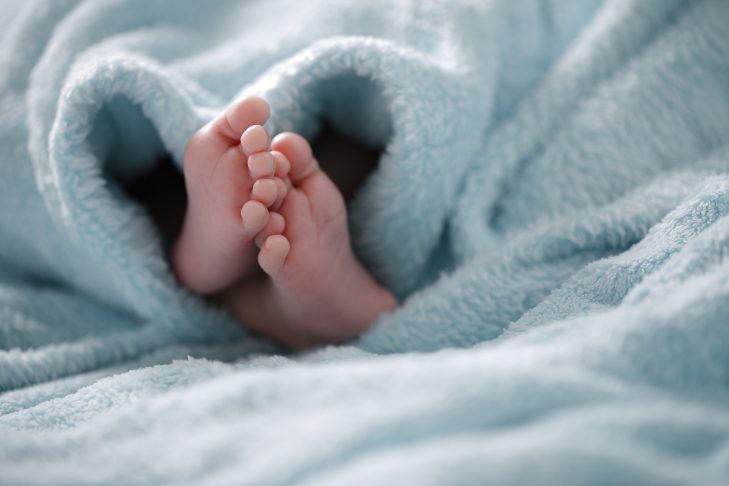I shared these words at my son’s brit milah on Monday, Jan. 14, 2019. In naming him Moshe Yeshayahu, my wife and I hoped to inspire him with stories of the Jewish past as he begins life’s journey.
In one of the many conversations my wife, Ziva, and I had as we were getting to know each other, Ziva, then a young Tanakh teacher, pointed out something about the story of revelation that I never thought of before. She asked me, “Do you think when God was narrating Moshe’s own life to him, Moshe ever thought, ‘Wait, that’s not how my conversation with Pharaoh went.” There must have been something strange about hearing God tell you the story of your own life. Since then, I’ve often wondered whether the story of revelation is unprecedented in that Moshe’s essential prophecy is not a prophecy about the future, but rather a prophecy about the past. At Sinai, God transmits to Moshe a divinely authorized history of the world from its creation to the present.
Moshe’s revelation of the past inspired Yosef Hayim Yerushalmi, in his book “Zakhor,” to argue that the greatest contribution of the Jews to the world is not monotheism, tikkun olam or “Judeo-Christian values,” but rather the idea of history—the idea that everything that happens is part of a story and that we can make sense of ourselves and of the world through telling that story.
Moshe, the prophet of the past, puts the experience of Bnei Yisrael in the desert into a story. It becomes part of the fulfillment of God’s promise to Avraham hundreds of years earlier. Moshe’s divinely authorized history transforms the experience of Bnei Yisrael from a hike in the desert into a moment in a much larger narrative arc: God’s plan for the Jewish people. History isn’t just about where we come from, but also where we are and where we are going.
So, with that, I want to take a minute to write a first draft of this baby’s past.
He comes from two great stories: First, the tragic story of Eastern European Jewry culminating in the Holocaust. Five of his great-grandparents were Holocaust survivors. But he is born as part of the first generation of Jews that won’t know Holocaust survivors personally. He will never hear the stories that Ziva and I heard from our grandparents about the trials of survival, the strange combination of striving, perseverance and luck that allowed them to make it through the war and build a new life in the ashes of the old. When I think of my grandparents, I shake my head in awe. I will never comprehend what they experienced nor the special qualities that enabled their ultimate triumph. I hope that the stories we tell our children about their great-grandparents will teach them that real evil does exist and that we have the responsibility to resist that evil.
This baby is also part of another great story: the incredible story of Jews in America. Three of his great-grandparents immigrated to the U.S. during the wave of 1880-1920 in which more than 2 million Eastern European Jews came to America. Here they found that America is different. They joined a country, the only country in the world in which Jews never had to fight for equality under the law. In America, his great-grandparents could go to law school, and work in the public sector as teachers and civil servants. It’s worth pausing to appreciate how unprecedented those options were in Jewish history. I hope their stories will inspire him to believe in the yet-to-be-fulfilled promise of America: America as a place where what you do matters more than who you are.
If Moshe is the prophet of the past, then Yeshayahu, for whom he is also named, is the prophet of the future. It is for good reason that when MLK wanted a picture of what the world would be like when his dream was fulfilled, he turned to Yeshayahu.
כָּל-גֶּיא, יִנָּשֵׂא, וְכָל-הַר וְגִבְעָה, יִשְׁפָּלוּ; וְהָיָה הֶעָקֹב לְמִישׁוֹר, וְהָרְכָסִים לְבִקְעָה.
Every valley shall be lifted up, and every mountain and hill shall be made low; and the rugged shall be made level, and the rough places a plain.
Yeshayahu prophecies a world in which all people live in peace regardless of the things that divide them. A world without war or violence, without poverty, hunger or suffering.
Just as Moshe invented history, the idea that the past is more than just one thing after another, that it tells us who we are, Yeshayahu’s prophecy invents the idea of the future, a dream worth fighting for, of a world that while we may never achieve it, we nonetheless continue to strive for.
As Yeshayahu wrote,
לֹא-יִשָּׂא גוֹי אֶל-גּוֹי חֶרֶב, וְלֹא-יִלְמְדוּ עוֹד מִלְחָמָה
“Nation will not lift a sword against another nation, nor shall they learn war anymore.”
This child exists in a world that feels very far from the one Yeshayahu describes. I hope the two stories of our family’s past, the Holocaust and American Jewish immigration, will inspire him to work for the future. The story of the Holocaust reveals the possibility of evil, but also the possibility of overcoming evil. The opportunities our family has had in America should inspire us to seek those same opportunities for others. I hope that he can draw on the stories we tell him about his past in order to bend the arc of history just a little bit closer to justice. I look forward to hearing the story that Moshe Yeshayahu writes for himself and seeing how it shapes the stories of those around him.
This post has been contributed by a third party. The opinions, facts and any media content are presented solely by the author, and JewishBoston assumes no responsibility for them. Want to add your voice to the conversation? Publish your own post here. MORE



